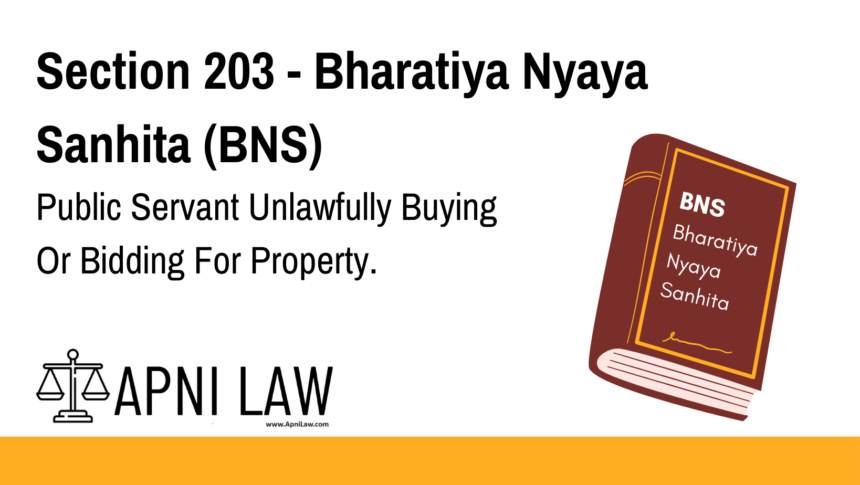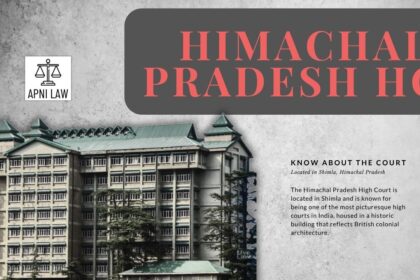Code – Section 203 (BNS)
Whoever, being a public servant, and being legally bound as such public servant,
not to purchase or bid for certain property, purchases or bids for that property, either in his
own name or in the name of another, or jointly, or in shares with others, shall be punished
with simple imprisonment for a term which may extend to two years, or with fine, or with both;
and the property, if purchased, shall be confiscated.
Explanation of Section 203 BNS
Section 203 of the Bharatiya Nyaya Sanhita (BNS), 2023, deals with restrictions on public servants regarding the purchase or bidding of property they are legally bound to avoid. The law prevents government officials from misusing their position for personal financial gains.
Key Provisions of Section 203 BNS
- Applicability to Public Servants: The law applies strictly to individuals holding a public office who are prohibited from engaging in certain property transactions.
- Prohibition on Purchase or Bidding: Public servants cannot bid or purchase restricted property, whether in their own name, through another person, or in partnership with others.
- Punishment:
- Simple imprisonment of up to two years, or
- Fine, or
- Both imprisonment and fine.
- Confiscation of Property: If a public servant illegally acquires such property, it will be confiscated by the state.
Illustration
Example 1: A Collector Bidding for Confiscated Land
A District Collector is legally prohibited from bidding on confiscated land auctions. If he bids in another person’s name and wins the property, he can be prosecuted under Section 203 BNS, and the property will be confiscated.
Example 2: A Police Officer Purchasing Auctioned Goods
A senior police officer participates in an auction of seized goods from a case. Since he is legally barred from purchasing such property, his actions fall under Section 203 BNS, making him liable for punishment.
Common Questions and Answers on Section 203 BNS
1. Why are public servants prohibited from purchasing or bidding on certain properties?
Public servants hold positions of power, and allowing them to bid or purchase such properties can lead to corruption, unfair advantages, and misuse of authority.
2. Can a public servant bid on property in someone else’s name?
No. Even if a public servant bids or purchases property using a proxy (e.g., a family member or friend), it still constitutes an offense under Section 203 BNS.
3. What happens if a public servant purchases such property unknowingly?
The law does not make exceptions for ignorance. If a public servant purchases restricted property, the transaction is illegal, and the property will be confiscated.
4. Is there a defense available under Section 203 BNS?
A public servant may argue that they were unaware of the restriction on purchasing the property. However, it is difficult to prove innocence if they are legally bound by duty to avoid such transactions.
5. Can a public servant challenge property confiscation under Section 203?
Yes, they can challenge it in a court of law, but the burden of proof lies on them to show that the purchase did not violate legal restrictions.
Conclusion
Section 203 BNS is a critical provision that ensures integrity and fairness in public administration. It prevents public officials from using their positions for personal financial gain by restricting their ability to purchase or bid on certain properties. Violation of this section results in imprisonment, fines, and confiscation of the property.
For more legal insights and expert opinions, visit ApniLaw today! 🚀








